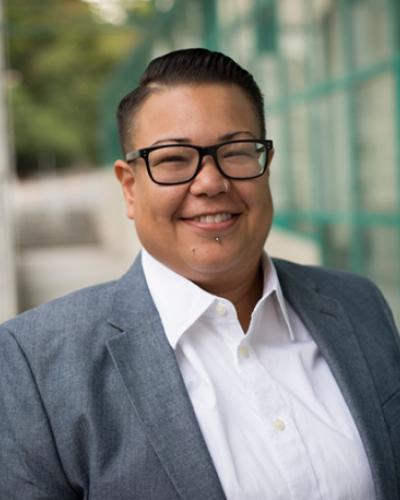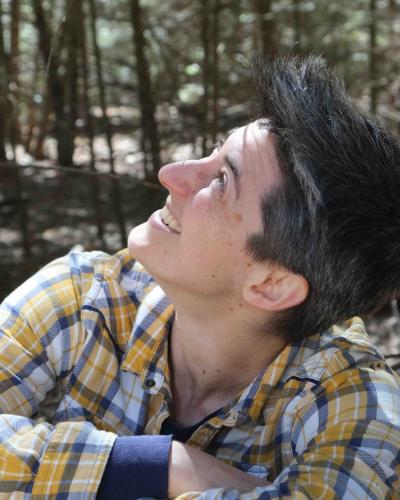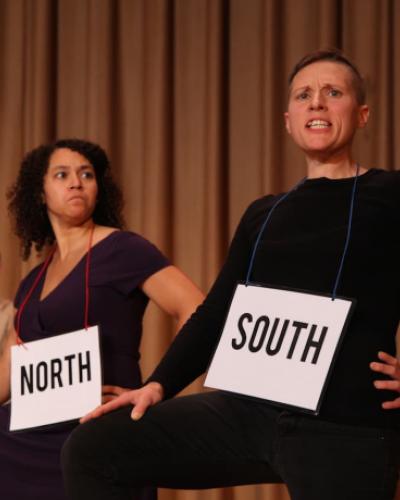By Matt Morgan
"On the Corner" reads like a play ripped from the headlines: An innocent young black man is confronted by a white police officer during a call about a suspicious person. The two men clash over the mistake and head toward a moment that could change their lives forever. Neither knows how exactly they got there and neither has time to consider.
When Cornell visiting lecturer Godfrey L. Simmons, Jr. began writing what would become On the Corner with his wife Sarah K. Chalmers for the Civic Ensemble theatre company in 2013, he wanted to go deeper than the moment of conflict. He didn’t want to know what happened in these polarizing moments, he wanted to know why. Why are these two well-intentioned men even in this position?
To find out, Simmons went in search of information. He studied race relations and the foundations of systemic racism in the United States. He reached out to young black men in the community and asked their opinion of law enforcement officers. He contacted the local police department, interviewing and reinterviewing them to get their perspective.
“As artists, we put ourselves in the best creative space if we have real questions, not if we have questions we already know the answers to,” Simmons says. “In the course of conversations about this issue, you begin peeling back to see the root cause of the root cause and you dig at it so you can figure out what needs to change.”
What Simmons found was a lot history he never learned about in school. The roots of racism in this country were more easily traceable than even he knew. He also realized there were good people with fair concerns on all sides of the issue.
To produce a play that had a chance to make a difference, Simmons knew he couldn’t preach. He had to let the people, facts and history guide the story and trust the bigger discussion would happen when it ended. In a way, it’s a play presented without comment.
In "On the Corner," Simmons uses time travel to add context. Starting with the moment of conflict, Julian, the young black man, and Officer James walk back their stories, retracing the days and weeks preceding, showing the events that fueled their disposition. For example, Julian was new to the area and had recently lost his mother, making his patience short.
The two characters then travel back in time decades and centuries to learn about race relations, slavery, Bacon’s Rebellion and other events that help explain why their reaction in that moment was not only understandable but inevitable.
“We’re not trying to change anybody’s mind,” Simmons says. “What we’re trying to do is say this is a deeper conversation that is imperative to have. It’s imperative to remove your stock answers. It’s imperative to remove your stock impulses about this.”
Seth Soulstein, a Cornell PMA graduate student who plays Officer James, says each character in the play is written with care. Officer James, for example, is a skilled police officer with good intentions who still found himself in a difficult situation.
“He’s not demonized, not stereotypical,” Soulstein says. “He’s a human police officer. He’s very nuanced in that way”
The depth of the character and the presence of historical scenes disarms defense mechanisms and changes the conversation moving forward, according to Soulstein.
“This is saying we’re all part of a system that comes out of a very real and documentable history,” Soulstein says. “If we are all aware of that, what do we do (now)?”
Soulstein joined the cast as Officer James during the November remount when the original actor was unable to participate due to a scheduling conflict. He says he felt fortunate to participate not only because of the great work of the Civic Ensemble but because it was at such a flash point in its relevancy.
“I’ve struggled to find a way to insert myself more vocally and actively into the Black Lives Matter movement,” Soulstein says. “It’s a great opportunity for me to participate in something that really can fuel a conversation in a community.”
"On the Corner" finished its second run with the Civic Ensemble in Ithaca last month. The Civic Ensemble is a community theatre company in Ithaca, N.Y. dedicated to exploring social, political, and cultural issues. Each performance featured a discussion afterward, quite literally starting the discussion Simmons was hoping for.
“We get people thinking about it,” Godfrey says. “We start the conversation.”





